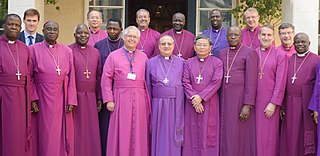Related Research Articles

Since the 1990s, the Anglican Communion has struggled with controversy regarding homosexuality in the church. In 1998, the 13th Lambeth Conference of Anglican bishops passed a resolution "rejecting homosexual practice as incompatible with Scripture". However, this is not legally binding. "Like all Lambeth Conference resolutions, it is not legally binding on all provinces of the Communion, including the Church of England, though it commends an essential and persuasive view of the attitude of the Communion." "Anglican national churches in Brazil, South Africa, South India, New Zealand and Canada have taken steps toward approving and celebrating same-sex relationships amid strong resistance among other national churches within the 80 million-member global body. The Episcopal Church in the U.S. has allowed gay marriage since 2015." "Church of England clergy have appeared to signal support for gay marriage after they rejected a bishops’ report which said that only a man and woman could marry in church." The Church of England's General Synod is set to discuss a diocesan motion "to create a set of formal services and prayers to bless those who have had a same-sex marriage or civil partnership". At General Synod in 2019, the Church of England announced that same-gender couples may remain married and recognised as married after one spouse experiences a gender transition provided that the spouses identified as opposite genders at the time of the marriage.

The Anglican Church of Australia, formerly known as the Church of England in Australia, is a Christian church in Australia and an autonomous church of the Anglican Communion. It is the second largest church in Australia after the Roman Catholic Church. According to the 2016 census, 3.1 million Australians identify as Anglicans. For much of Australian history the church was the largest religious denomination. It remains today one of the largest providers of social welfare services in Australia.
Same-sex marriage in South Africa has been legal since the Civil Union Act came into force on 30 November 2006. The decision of the Constitutional Court in the case of Minister of Home Affairs v Fourie on 1 December 2005 extended the common-law definition of marriage to include same-sex spouses—as the Constitution of South Africa guarantees equal protection before the law to all citizens regardless of sexual orientation—and gave Parliament one year to rectify the inequality in the marriage statutes. On 14 November 2006, the National Assembly passed a law allowing same-sex couples to legally solemnise their union 229 to 41, which was subsequently approved by the National Council of Provinces on 28 November in a 36 to 11 vote, and the law came into effect two days later.
The Anglican Communion Network (ACN) was a theologically conservative network of Anglican and Episcopalian dioceses and parishes in the United States working toward Anglican realignment. The Anglican Communion Network later developed into the Anglican Church in North America.
The blessing of same-sex marriages and same-sex unions is an issue about which Christian churches are in ongoing disagreement. These disagreements are primarily centered on the interpretation of various scripture passages related to homosexuality, and in some churches on varying understandings of homosexuality in terms of psychology, genetics and other scientific data. While various Church bodies have widely varying practices and teachings, individual Christians of every major tradition are involved in practical (orthopraxy) discussions about how to respond to the issue.
The Anglican Church in Aotearoa, New Zealand and Polynesia is an autonomous province of the Anglican Communion serving New Zealand, Fiji, Tonga, Samoa, and the Cook Islands. Since 1992 the church has consisted of three tikanga or cultural streams: Aotearoa, New Zealand, and Polynesia. The church's constitution says that, among other things, it is required to "maintain the right of every person to choose any particular cultural expression of the faith". As a result, the church's General Synod has agreed upon the development of the three-person primacy based on this three tikanga system. It has three primates (leaders), each representing a tikanga, who share authority.

The Anglican Church of Southern Africa, known until 2006 as the Church of the Province of Southern Africa, is the province of the Anglican Communion in the southern part of Africa. The church has twenty-nine dioceses, of which twenty-one are located in South Africa, three in Mozambique, and one each in Angola, Lesotho, Namibia, Swaziland and Saint Helena. In South Africa, there are between 3 and 4 million Anglicans out of an estimated population of 45 million.

The Dutch Reformed Church is a Reformed Christian denomination in South Africa. It also has a presence in neighbouring countries, such as Namibia, Swaziland, and parts of Botswana, Zimbabwe and Zambia. It claims 1.1 million members and 1,602 ordained ministers in 1,158 congregations.

In 2003, the Lambeth Commission on Communion was appointed by the Anglican Communion to study problems stemming from the consecration of Gene Robinson, the first noncelibate self-identifying gay priest to be ordained as an Anglican bishop, in the Episcopal Church in the United States and the blessing of same-sex unions in the Anglican Diocese of New Westminster. The Commission, chaired by Archbishop Robin Eames, published its findings as the Windsor Report on 18 October 2004. The report recommended a covenant for the Anglican Communion, an idea that did not come to fruition.
The Anglican Church of Tanzania (ACT) is a province of the Anglican Communion based in Dodoma. It consists of 28 dioceses headed by their respective bishops. It seceded from the Province of East Africa in 1970, which it shared with Kenya. The current Primate and Archbishop is Maimbo Mndolwa, enthroned on 20 May 2018.
The Church of the Province of Central Africa is part of the Anglican Communion, and includes 15 dioceses in Botswana, Malawi, Zambia and Zimbabwe. The Primate of the Church is the Archbishop of Central Africa. Albert Chama is the current Archbishop, being installed on 20 March 2011, succeeding Bernard Amos Malango who retired in 2007. From 1980 to 2000, Walter Khotso Makhulu, a noted Anti-Apartheid activist, was Archbishop as well as Bishop of Botswana. Archbishop Chama continues to serve as Bishop of Northern Zambia, and is the second Zambian to be Archbishop of Central Africa.

The Diocese of Cape Town is a diocese of the Anglican Church of Southern Africa (ACSA) which presently covers central Cape Town, some of its suburbs and the island of Tristan da Cunha, though in the past it has covered a much larger territory. The Ordinary of the diocese is Archbishop of Cape Town and ex officio Primate and Metropolitan of the ACSA. His seat is St. George's Cathedral in Cape Town.

The Anglican Diocese of Brisbane, also known as Anglican Church Southern Queensland, is based in Brisbane, Queensland, Australia. The diocesan bishop's seat is St John's Cathedral, Brisbane. The current Archbishop of Brisbane is Phillip Aspinall, who was formerly the Primate of the Anglican Church of Australia.
The Anglican realignment is a movement among some Anglicans to align themselves under new or alternative oversight within or outside the Anglican Communion. This movement is primarily active in parts of the Episcopal Church in the United States and the Anglican Church of Canada. Two of the major events which contributed to the movement were the 2002 decision of the Diocese of New Westminster in Canada to authorise a rite of blessing for same-sex unions, and the nomination of two openly gay priests in 2003 to become bishops. Jeffrey John, an openly gay priest with a long-time partner, was appointed to be the next Bishop of Reading in the Church of England and the General Convention of the Episcopal Church ratified the election of Gene Robinson, an openly gay non-celibate man, as Bishop of New Hampshire. Jeffrey John ultimately declined the appointment due to pressure.

The Anglican Global South is a grouping of 25 of the 39 provinces of the Anglican Communion, plus the Anglican Church in North America and the Anglican Church in Brazil as the 26th and the 27th members.

Thabo Cecil Makgoba is the South African Anglican Archbishop of Cape Town. He had served as Bishop of Grahamstown.

The Evangelical Lutheran Church in Southern Africa is a Lutheran church in South Africa. The Church has 580,000 baptized members, in seven Dioceses in South Africa, Botswana, and Swaziland, and is the largest Lutheran church in the southern African region.
Sitembele Tobela Mzamane is a South African Anglican bishop. He is a former Bishop of Mthatha, and although the first bishop to bear that title, he is the 10th incumbent, since the bishopric was previously known as St John's.
Justus Mauritius Marcus was Regional Bishop of Saldanha Bay in the Diocese of Cape Town, 2002 to 2003, having served as Dean of Kimberley and Rector of St Cyprian's Cathedral from 1992 to 2002. He died from cancer, aged 48, on 1 December 2003. Marcus was predeceased by his first wife, Milly. His second wife and widow is Sarah Rowland Jones, a fellow priest who then fulfilled a research ministry in the Anglican Church of Southern Africa at the behest of two successive Archbishops of Cape Town before returning to Wales in late 2013.
References
- ↑ "Church's decision to bless same-sex unions hailed | Cape Times" . Retrieved 2018-10-10.
- ↑ "Church's decision to bless same-sex unions hailed". www.msn.com. Retrieved 2018-10-10.